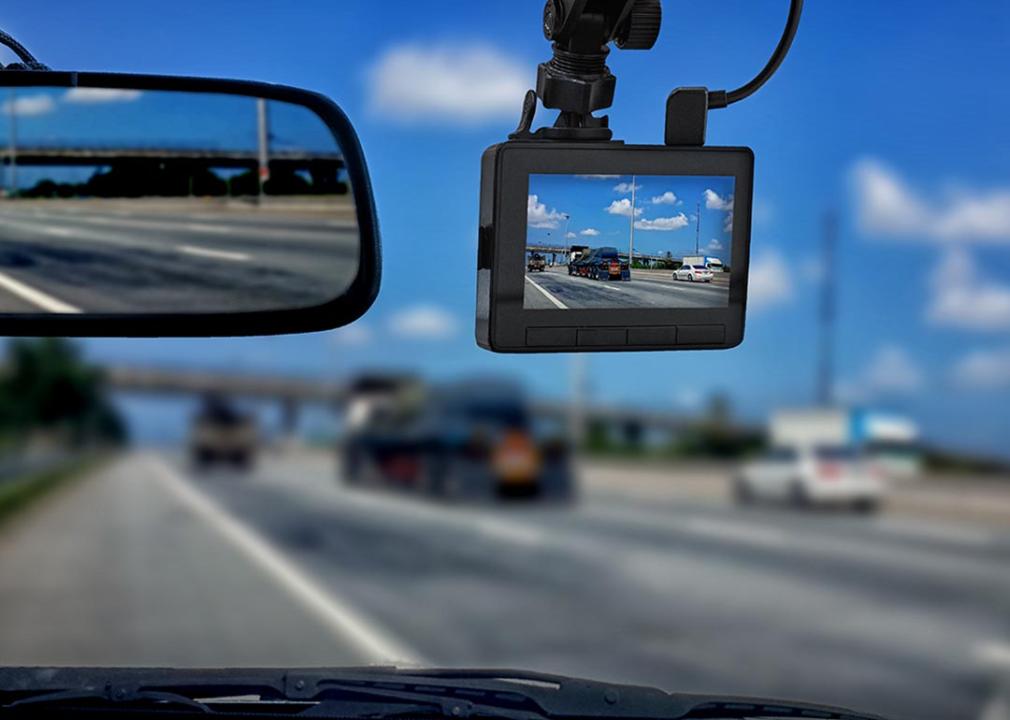
wanrung stock // Shutterstock
Written by John Davey
Car accidents are unforeseen events that can bring about numerous challenges, from property damage to potential injury claims. As technology advances, one device has gained popularity for its ability to provide invaluable evidence in accident situations – the dashcam. In this article, Cheap Insurance will explore the value of dashcams in vehicle accidents and how they can play a role in both safeguarding your car insurance and finding the cheapest car insurance rates.
Dashcams act as impartial eyewitnesses, capturing real-time footage of the road ahead and the events leading up to an accident. This video evidence can be invaluable in determining fault in an accident and preventing fraudulent claims. Insurance companies can use dashcam footage to assess the situation accurately, leading to fair claim settlements. As a result, the claims process becomes smoother, and you are less likely to encounter disputes over liability.
When filing a car insurance claim, having dashcam footage can make all the difference. Instead of relying solely on verbal accounts or sketchy details, insurance adjusters can use the dashcam video to recreate the accident scene accurately. This evidence not only expedites the claims process but also increases the likelihood of receiving a fair settlement.
Understanding insurance companies’ perspective on vehicle dashcams: Advantages and considerations
As dashcams become more prevalent in vehicles, insurance companies have taken notice of their potential impact on the insurance industry. Here’s an overview of what insurance companies think about vehicle dashcams and how these devices are influencing insurance practices.
Enhanced claims process
Insurance companies recognize that dashcams can significantly improve the claims process. The availability of video evidence from dashcams provides insurers with a clear and objective view of what transpired during an accident. This helps expedite claim investigations, leading to quicker claims settlements and reduced administrative overhead.
Improved claims accuracy
Dashcams contribute to increased claims accuracy by providing a more comprehensive view of an accident. This minimizes the possibility of fraudulent or exaggerated claims, as insurers can cross-reference the incident details with the dashcam footage to verify the accuracy of the claim.
Better determination of fault
In accidents where liability is disputed, dashcam footage acts as an unbiased witness, helping insurance companies determine fault more accurately. This objective evidence assists insurers in making fair and equitable claim decisions, reducing disputes between involved parties.
Promoting safer driving habits
Insurance companies also recognize the potential of dashcams to promote safer driving behaviors. Knowing that their actions are being recorded, drivers may become more cautious, leading to a reduction in risky driving behaviors such as speeding, abrupt lane changes, and running red lights. As a result, insurance companies may observe fewer accidents and claims, potentially leading to reduced insurance premiums for policyholders with dashcams.
Incentives for dashcam use
Some insurance companies have started offering incentives to policyholders who install dashcams in their vehicles. These incentives can include discounts on insurance premiums or special benefits that encourage policyholders to embrace this technology. By rewarding dashcam use, insurance companies hope to create a safer driving environment and mitigate risk.
Addressing privacy concerns
While recognizing the benefits of dashcams, insurance companies are mindful of potential privacy concerns. They emphasize that the primary purpose of dashcams should be to record road incidents and support accident claims. Insurers also ensure that the use of dashcam footage adheres to data protection regulations and respects the privacy of individuals captured in the recordings.
Encouraging responsible usage
Insurance companies encourage responsible dashcam usage among their policyholders. This includes complying with local laws and regulations regarding dashcams, as well as using the footage solely for its intended purpose – documenting road incidents and supporting insurance claims.
Embracing technological advancements
As technology continues to evolve, insurance companies remain open to embracing new advancements in dashcam technology. They recognize the potential of innovative features, such as real-time streaming or AI-assisted accident detection, in further improving the claims process and enhancing customer experience.
Insurance companies view vehicle dashcams as a positive addition to the insurance landscape. These devices have the potential to streamline the claims process, enhance claims accuracy, and promote safer driving habits. While addressing privacy concerns and encouraging responsible usage, insurance companies embrace dashcams as a tool that benefits both insurers and policyholders. As dashcam technology continues to evolve, insurance companies will likely continue to explore and leverage its full potential to improve their services and foster a safer driving environment.
Navigating the privacy concerns of dashcams in vehicles
While dashcams offer undeniable benefits in terms of road safety, accident evidence, and potential insurance discounts, they also raise important privacy considerations. Personal privacy groups are at the forefront of scrutinizing the implications of widespread dashcam use. Let’s delve into some of the common concerns these groups raise regarding the deployment of dashcams in vehicles:
Invasion of privacy
One of the primary concerns that personal privacy groups voice is the potential invasion of privacy caused by dashcams. These devices continuously record the surrounding environment, capturing not only road incidents but also the activities and conversations of passengers and pedestrians. There are apprehensions that this constant recording might encroach upon the privacy of individuals who may not be aware that they are being filmed.
Data storage and access
The storage of sensitive data is another issue that worries privacy advocates. Dash cams capture and store video footage, often including the vehicle’s location and surrounding details. Questions arise about who has access to this data, how long it is retained, and how securely it is stored. There are concerns that unauthorized access to this data or its misuse might compromise individuals’ privacy and security.
Potential misuse of footage
Privacy groups are wary of the potential misuse of dashcam footage. While the primary purpose of dashcams is to document accidents and ensure driver accountability, there is a possibility that the recorded footage could be exploited for other purposes. Whether it is for voyeurism, surveillance, or sharing online without consent, privacy advocates caution against the unintended consequences of unrestricted access to dashcam recordings.
Dual-edged sword of surveillance
While dashcams can help prevent insurance fraud and assist in resolving accident disputes, they also introduce a level of constant surveillance on public roads. Personal privacy groups argue that this raises questions about the balance between safety and individual freedom. Striking the right balance to ensure safety while preserving personal privacy is a delicate challenge that needs careful consideration.
Addressing privacy safeguards
To address these privacy concerns, personal privacy groups advocate for clear guidelines and regulations governing the use of dashcams. They stress the importance of informed consent, ensuring that all passengers are aware of the presence of a dash cam and its recording capabilities. Additionally, they call for data protection measures, limiting access to recordings to authorized parties and establishing protocols for secure data storage and retention.
Encouraging responsible usage
Privacy groups also emphasize the need for responsible usage of dashcams. This includes promoting ethical behavior among dashcam owners, respecting the privacy of others, and using the footage only for its intended purpose – recording road incidents
While personal privacy groups acknowledge the potential benefits of dashcams in enhancing road safety and supporting insurance claims, they remain vigilant about the possible privacy implications. Striking a balance between safety and privacy is crucial as we navigate the growing popularity of dashcams in vehicles. By promoting informed consent, data protection, and responsible usage, we can ensure that dashcams serve their intended purpose while respecting the privacy rights of individuals on the road. Collaboration between stakeholders, including personal privacy groups, vehicle manufacturers, and regulatory authorities, is essential to address these concerns effectively and responsibly integrate dashcams into our driving culture.
Insights from law enforcement: Evaluating the impact of vehicle dashcams
As dashcams become increasingly prevalent in vehicles, law enforcement agencies have been closely observing their impact on road safety, accident investigations, and law enforcement procedures. Let’s explore what law enforcement thinks about vehicle dashcams and how these devices are influencing their practices:
Supporting objective accident investigations
Law enforcement officers appreciate the valuable role dashcams play in providing objective and unbiased evidence during accident investigations. The recorded footage helps reconstruct the sequence of events leading up to a collision, allowing officers to determine fault accurately. This streamlines the investigation process and ensures that justice is served based on concrete evidence.
Improving officer accountability
Dashcams not only hold civilians accountable for their actions on the road but also promote accountability within law enforcement itself. The presence of dashcams in police vehicles fosters transparency and helps maintain public trust in law enforcement. Officers know that their actions are under scrutiny, which can encourage them to act professionally and responsibly during interactions with the public.
Enhancing officer training and evaluation
Dashcam footage serves as a valuable training tool for law enforcement agencies. It allows supervisors to review officers’ responses to different scenarios, identify areas for improvement, and provide targeted training. Additionally, dashcams help in evaluating the appropriateness of an officer’s actions during critical incidents, ensuring that their conduct aligns with departmental policies and standards.
Resolving disputes and false allegations
Dashcams have become indispensable in resolving disputes between law enforcement and the public. In encounters where conflicting accounts arise, video evidence can clarify the situation and validate an officer’s actions. Moreover, dashcams help refute false allegations made against officers, preventing baseless complaints from tarnishing an officer’s reputation.
Upholding traffic law enforcement
Law enforcement officers acknowledge the positive impact of dashcams in promoting adherence to traffic laws. Knowing that their actions are being recorded, drivers tend to be more cautious and are less likely to engage in reckless driving behaviors. This contributes to overall road safety and reduces the number of traffic violations.
Managing privacy concerns
While recognizing the advantages of dashcams, law enforcement agencies are also attentive to privacy concerns. They are committed to using dashcams responsibly and respecting the privacy rights of individuals when handling recorded footage. Striking a balance between accountability and privacy remains a priority for law enforcement agencies.
Embracing advancements in technology
As technology continues to evolve, law enforcement agencies are open to embracing advancements that can enhance their operations. Dashcams with additional features, such as live streaming capabilities and built-in GPS, are being explored for their potential to further improve officer safety and efficiency in emergency situations.
Overall, law enforcement views vehicle dashcams as valuable tools that contribute to safer roads, objective accident investigations, and enhanced officer accountability. While acknowledging their positive impact, law enforcement remains mindful of privacy concerns and strives to use dashcams responsibly. As dashcam technology continues to evolve, it is expected that law enforcement will continue to adapt and harness the full potential of these devices in their commitment to serving and protecting the community.
Final thoughts
Dashcams can be valuable tools in safeguarding your car insurance claims and enhancing road safety. The unbiased evidence they provide can expedite the claims process and protect against fraudulent activities. Moreover, with safer driving habits, you may even find opportunities for cheap insurance rates from insurers offering discounts for dashcam-equipped vehicles.
Before installing a dashcam, it’s essential to research local laws and choose a model that addresses privacy concerns appropriately. With the right dashcam, you’ll have an extra layer of protection on the road and the potential for a more favorable car insurance experience.
This story was produced by Cheapinsurance.com and reviewed and distributed by Stacker Media.















